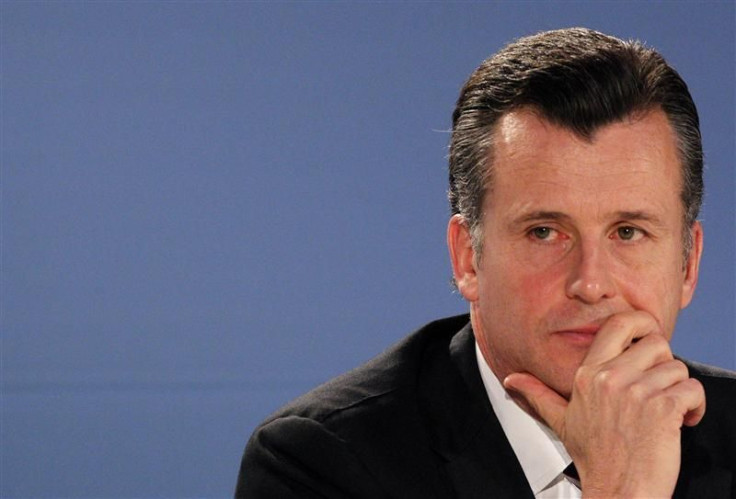Swiss Central Bank Chief Faces Battle to Keep Job

(REUTERS) -- Switzerland's top central banker is battling for his future as he faces a grilling on Thursday over a controversial currency trade made by his wife three weeks before he oversaw moves to impose a cap on the Swiss franc.
Swiss National Bank (SNB) Chairman Philipp Hildebrand will break his silence over the affair at 1500 GMT (10 a.m. ET) after an employee of his family's bank leaked details of the trade to the lawyer of a political adversary.
The growing furor now threatens to tarnish the image of the SNB, whose credibility is key to its ability to prevent the Swiss franc from becoming too strong and harming exporters.
The Swiss cabinet late on Wednesday insisted it had full confidence in Hildebrand, an architect of tougher global banking regulations and vice chairman of the international supervisory body the Financial Stability Board (FSB). But calls grew for him to fall on his sword.
I think he should step down, Christoph Moergeli, a parliamentarian of the right-wing Swiss People's Party (SVP), told Reuters.
It can't be that the person who steers the course of our currency, who determines the value of our francs and who determines the value of our wealth conducts foreign exchange business. He has his wealth at the back of his mind, not the interest of the Swiss franc.
A cartoon on the front page of the daily Tages-Anzeiger showed Hildebrand set ablaze, laboriously reading the instructions on a fire extinguisher marked transparency.
The unsuitable game of secrecy surrounding own-trading regulations and the report on the Hildebrand case have already damaged the reputation of the national bank, a commentator in the St. Galler Tageblatt daily wrote. Even the smallest shadow over the central bank is one too many.
A man who used his bank account for private forex deals worth several hundred thousand francs is simply in the wrong place heading the central bank, the deputy editor of the Berner Zeitung said in an editorial. Hildebrand must vacate his post.
PLAYING WITH FIRE
His wife, Kashya Hildebrand, a former hedge fund trader who now runs a Zurich art gallery, spent 400,000 Swiss francs ($423,800) to buy ridiculously cheap dollars on August 15, three weeks before her husband oversaw steps to cap the rise of the franc.
Switzerland guards bank client confidentiality jealously -- to the extent that its banks are plagued by scandals over their role in tax avoidance schemes for the world's wealthy -- so the Bank Sarasin employee who leaked Kashya's trade was also in the firing line.
The state prosecutor of the canton of Zurich said on Thursday it was starting an investigation into a 39-year-old man
for breaking the law and publishing bank data about the Swiss central banker.
The man, who worked in the IT department, gave the data to a lawyer close to Hildebrand's sharpest critic Christoph Blocher, a leading member of the Swiss People's Party, before handing himself to the police.
The central bank itself has also come under mounting criticism for failing to publish its internal ethics codes, unlike other central banks, and on Wednesday bowed to pressure to release staff guidelines as well as a report it had already commissioned into the affair.
Auditor PricewaterhouseCoopers (PwC) concluded internal rules had not been broken, saying Hildebrand had not known in advance about his wife's dealings last August and that there had therefore been no misuse of privileged information.
Hildebrand, whose salary of around 860,000 Swiss francs makes him the world's highest paid major central banker, also bought dollars worth $1.2 million in March 2011 after selling real estate in Switzerland, according to PwC.
The Hildebrand couple then sold $516,000 on October 4 for 475,000 francs to fund the purchase of another property in Switzerland. But the trades did not breach internal ethics rules, which forbid currency trades within a six-month period.
Weekly magazine Weltwoche, however, which has links to the SVP, alleged the central banker had personally gained from currency trades before the cap was imposed.
SNB's credibility is crucial to its ability to keep the cap of 1.20 francs per euro in place without being forced to spend billions defending it from those seeking a safe haven from the euro zone debt crisis.
While Credit Suisse analysts said Hildebrand's comments on Thursday were likely to have little effect on the franc, others said a resignation could trigger a sell-off, though probably shortlived.
That doesn't mean to say that a resignation would be disregarded by the market, said Neil Mellor, currency strategist, Bank of New York Mellon.
It's entirely plausible that the market may sell the Swiss franc on the back of it, but I suspect people would use any sell-off to buy back in, because there are bigger fish to fry, not least the fact that the Swiss franc is set to remain a safe haven through 2012.
($1 = 0.9439 Swiss francs)
(Additional reporting by Naomi Tajitsu; Writing by Kirstin Ridley; Editing by Will Waterman)
© Copyright Thomson Reuters 2024. All rights reserved.





















